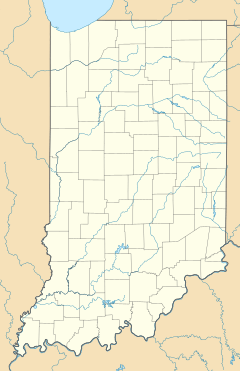Rogersville, Indiana facts for kids
Quick facts for kids
Rogersville, Indiana
|
|
|---|---|
|
Unincorporated place
|
|
| Country | United States |
| State | Indiana |
| County | Henry |
| Township | Stoney Creek |
| Elevation | 1,024 ft (312 m) |
| Population
(2020)
|
|
| • Total | 7 |
| ZIP code |
47386
|
| GNIS feature ID | 442256 |
Rogersville is a very small community in Indiana, USA. It is located in Henry County, not far from Blountsville, Indiana. Only a few people live there, with a population of 7 as of 2020. The village sits about 1,024 feet (312 meters) above sea level. Rogersville was started in January 1837 by two people named James O. Rogers and John R. Colburn.
Contents
A Look Back at Rogersville's History
Rogersville has an interesting past, even though it's a small place today.
Early Days and the Post Office
Back in 1851, Rogersville had its own post office. A post office is where people send and receive mail. The first person in charge of the post office was called a postmaster. His name was Jabesh Luellen. Later, his son, David M. Luellen, took over the job. David was also a merchant in the village, which means he bought and sold goods.
Shops and Services in the 1870s
By 1871, Rogersville was a busy little place! It had several important shops and services. There was a harness shop, where equipment for horses was made or fixed. There was also a blacksmith shop, where a blacksmith would shape metal using heat and tools. People could buy shoes at the shoe store and food at the grocery store. There was even a dry goods store, which sold things like fabric, clothing, and other household items. In 1871, a doctor named Dr. Kerr also lived and worked in Rogersville, helping people who were sick.
Rogersville and the Underground Railroad
Rogersville played a special role in history. Some people who lived there were involved with the Underground Railroad. This was a secret network of safe houses and routes. It helped enslaved people escape to freedom in the years before the American Civil War.
Three residents of Rogersville were known as "conductors" on this network. These brave individuals were Jonathan Macy, his son-in-law Jabesh Luellen (the former postmaster), and Dr. William M. Kerr (the village physician). They helped guide and protect those seeking freedom.



